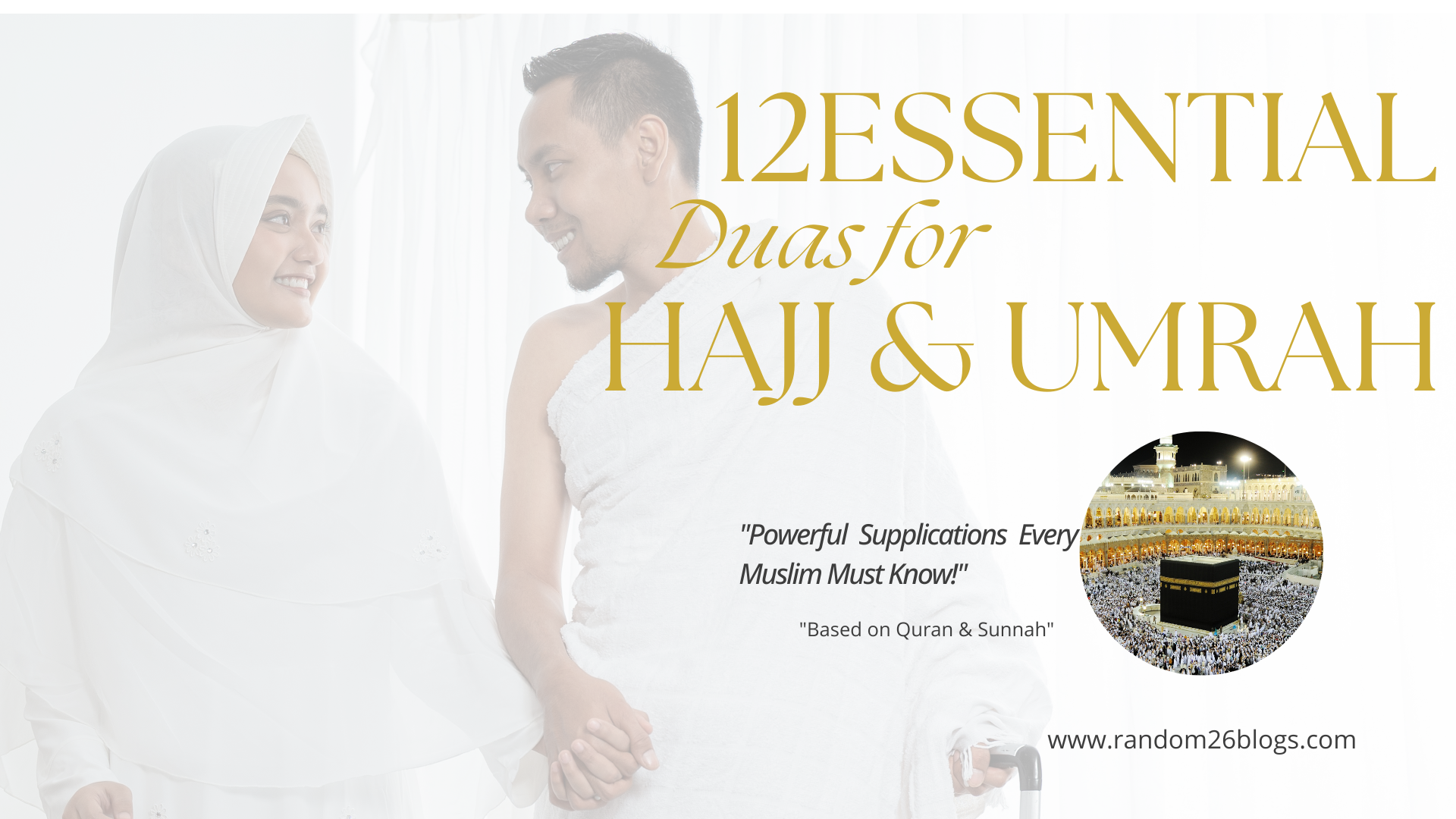The sacred pilgrimage of Hajj, one of Islam’s five pillars, is a profound journey of faith, reflection, and connection with Allah. Equally significant is Umrah, the “lesser pilgrimage,” which can be performed at any time of the year. Both acts of worship are deeply spiritual experiences, and among the most powerful acts a pilgrim can engage in during these journeys is making dua (supplication).
The Prophet Muhammad ﷺ emphasized the immense value of dua during Hajj and Umrah, stating:
“Those who perform Hajj and Umrah are Allah’s guests. If they supplicate Him, He answers them, and if they seek His forgiveness, He forgives them.” (Mishkat al-Masabih 2536).
To help pilgrims maximize this blessed opportunity, here are 12 essential duas to recite during Hajj and Umrah, rooted in the Quran and Sunnah.
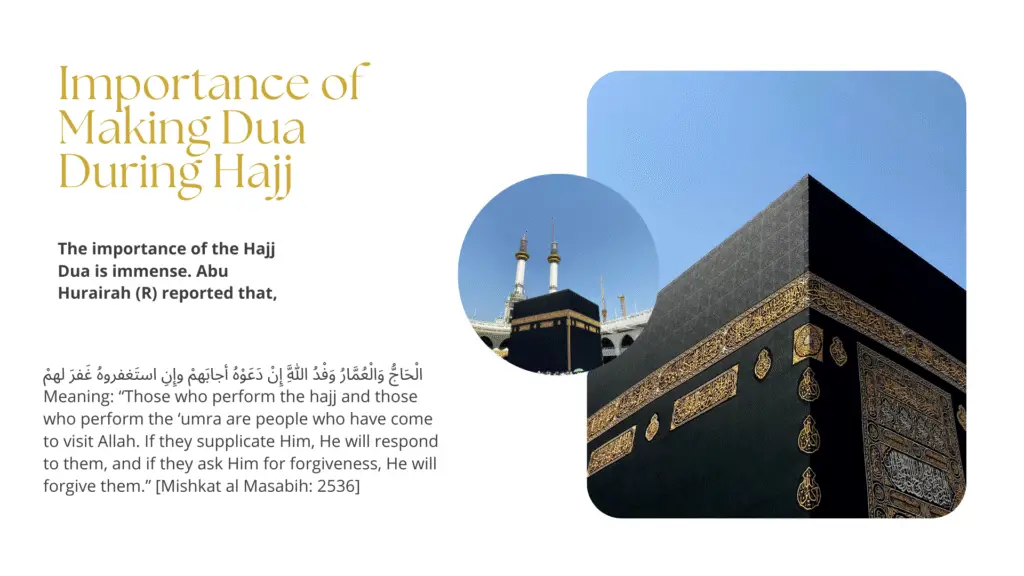
1. Dua for Traveling
Begin your journey by praising Allah and seeking His protection:
Arabic:
سُبْحَانَ الَّذِيْ سَخَّرَ لَنَا هٰذَا وَمَا كُنَّا لَهُ مُقْرِنِيْنَ، وَإِنَّا إِلَى رَبِّنَا لَمُنْقَلِبُوْنَ
Transliteration:
Subhanalladhi sakhkhara lana hadha wa ma kunna lahu muqrinin, wa inna ila Rabbina lamunqalibun.
Meaning:
“Glory be to Him Who has provided this for us, though we could never have attained it ourselves. Surely, to our Lord we will return.” (Hisnul Muslim 207)
Recite this dua three times, followed by Allahu Akbar (الله أكبر) to begin your journey with gratitude and trust in Allah.
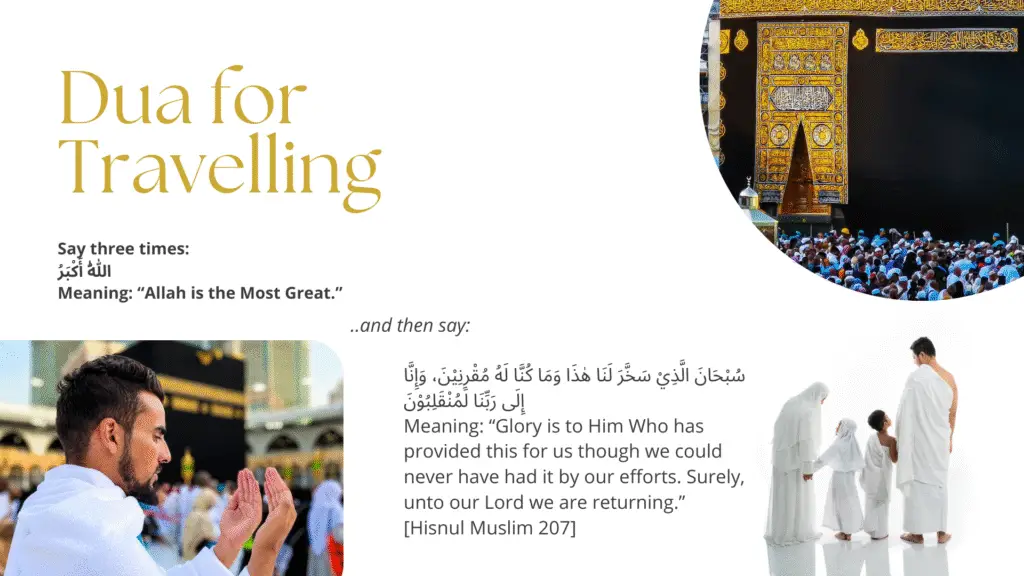
2. Talbiyah: The Pilgrim’s Declaration
The Talbiyah is recited throughout Hajj and Umrah, symbolizing your response to Allah’s call:
Arabic:
لَبَّيْكَ اَللّٰهُمَّ لَبَّيْكَ، لَبَّيْكَ لَا شَرِيْكَ لَكَ لَبَّيْكَ، إِنَّ الْحَمْدَ، وَالنِّعْمَةَ، لَكَ وَالْمُلْكَ، لَا شَرِيْكَ لَكَ
Transliteration:
Labbaik Allahumma labbaik, labbaik la sharika laka labbaik. Innal-hamda, wan-ni’mata, laka wal-mulk, la sharika lak.
Meaning:
“Here I am, O Allah, here I am. Here I am, You have no partner, here I am. All praise, grace, and sovereignty belong to You. You have no partner.” (Sunan Ibn Majah 2919)
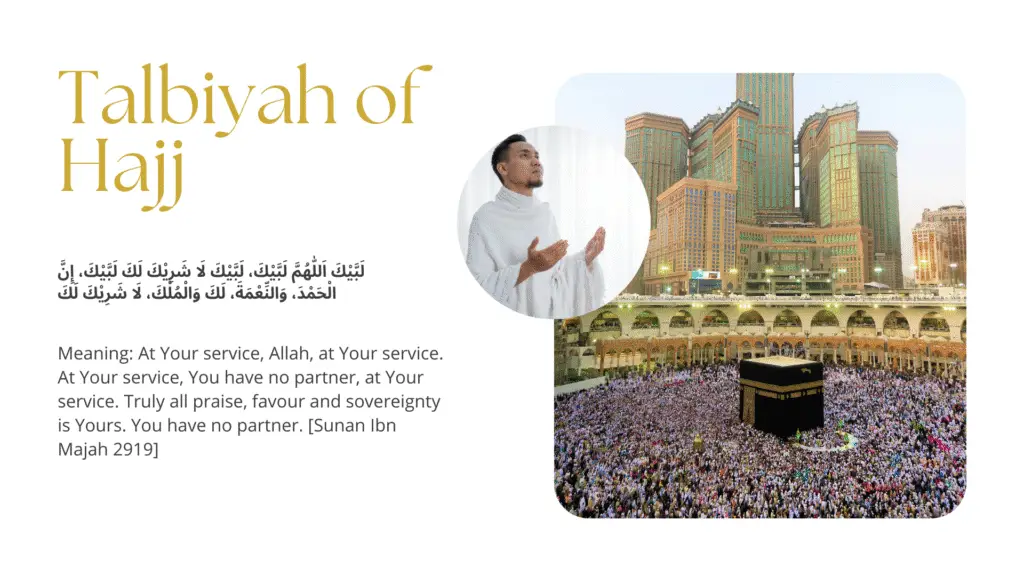
3. Dua During Tawaf (Circumambulation of the Kaaba)
While circling the Kaaba, there are no specific prescribed duas, but the Prophet ﷺ encouraged general supplication and dhikr. Pour your heart out to Allah, seek forgiveness, and ask for worldly and eternal blessings.
4. Dua at Safa and Marwah
Before beginning Sa’i (walking between Safa and Marwah), recite:
Quranic Verse (Surah Al-Baqarah 2:158):
إِنَّ ٱلصَّفَا وَٱلْمَرْوَةَ مِن شَعَآئِرِ ٱللَّهِ
“Indeed, Safa and Marwah are among the symbols of Allah.”
At the top of Safa, face the Kaaba and recite:
Arabic:
لَا إِلٰهَ إِلَّا اللّٰهُ وَحْدَهُ لَا شَرِيْكَ لَهُ
Transliteration:
La ilaha illallah, wahdahu la sharika lah.
Meaning:
“There is no god but Allah alone, with no partner.” (Sunan An-Nasai 2973)
Repeat the same at Marwah.
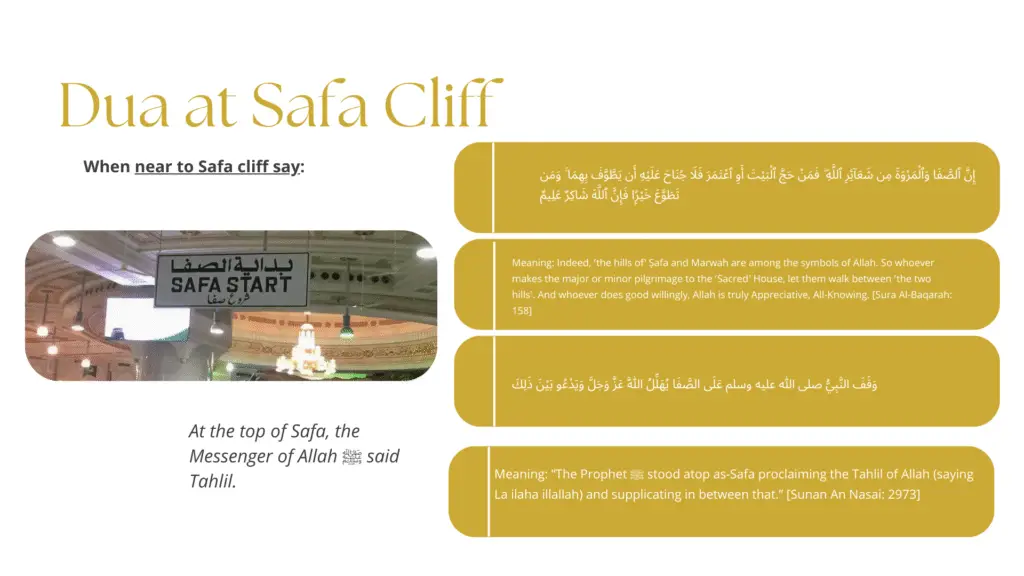
5. Dua Between the Yemeni Corner and Black Stone
While performing Tawaf, between the Yemeni Corner (Rukn al-Yamani) and the Black Stone, recite:
Arabic:
رَبَّنَا آتِنَا فِي الدُّنْيَا حَسَنَةً وَفِي الْآخِرَةِ حَسَنَةً وَقِنَا عَذَابَ النَّارِ
Transliteration:
Rabbana atina fid-dunya hasanatan wa fil-akhirati hasanatan wa qina ‘adhaban-nar.
Meaning:
“Our Lord! Grant us goodness in this world and the Hereafter, and protect us from the torment of the Fire.” (Sahih Ibn Hibban 3826)
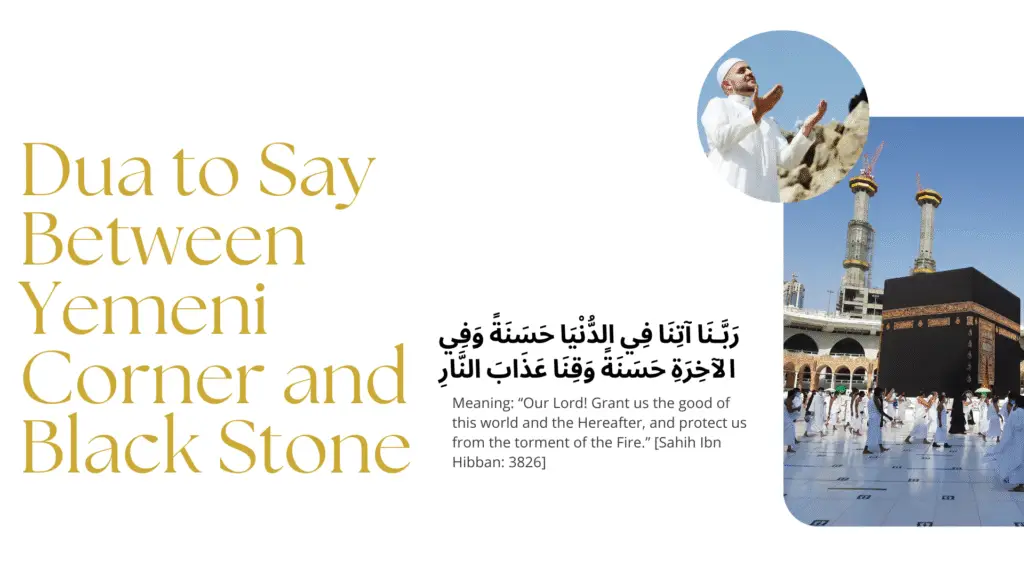
6. Takbir at the Black Stone
Each time you pass the Black Stone during Tawaf, raise your hand and say:
Arabic:
اَللّٰهُ أَكْبَرُ
Transliteration:
Allahu Akbar!
Meaning:
“Allah is the Greatest!” (Hisnul Muslim 116)
7. Dua at Muzdalifah (Mash’ar al-Haram)
Upon reaching Muzdalifah during Hajj, stand in prayer and recite:
Arabic:
لَا إِلٰهَ إِلَّا اللّٰهُ وَحْدَهُ لَا شَرِيْكَ لَهُ، لَهُ الْمُلْكُ وَلَهُ الْحَمْدُ وَهُوَ عَلَى كُلِّ شَيْءٍ قَدِيرٌ
Transliteration:
La ilaha illallah, wahdahu la sharika lah, lahul-mulku wa lahul-hamd, wa huwa ‘ala kulli shayin qadeer.
Meaning:
“There is no god but Allah alone, with no partner. To Him belongs all sovereignty and praise, and He is over all things competent.” (Hisnul Muslim 120)
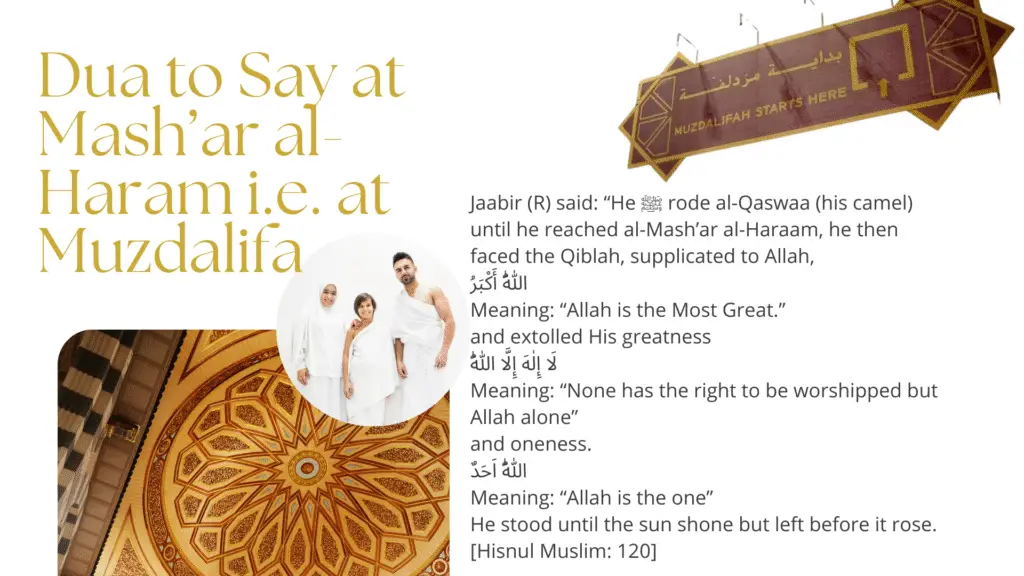
8. The Best Dua on the Day of Arafah
The Day of Arafah is the pinnacle of Hajj. The Prophet ﷺ said:
“The best supplication is that of the Day of Arafah.” (Tirmidhi)
Arabic:
لَا إِلٰهَ إِلَّا اللّٰهُ وَحْدَهُ لَا شَرِيْكَ لَهُ، لَهُ الْمُلْكُ وَلَهُ الْحَمْدُ وَهُوَ عَلَى كُلِّ شَيْءٍ قَدِيرٌ
Transliteration:
La ilaha illallah, wahdahu la sharika lah, lahul-mulku wa lahul-hamd, wa huwa ‘ala kulli shayin qadeer.
Meaning:
“There is no god but Allah alone, with no partner. To Him belongs all dominion and praise, and He is over all things omnipotent.”
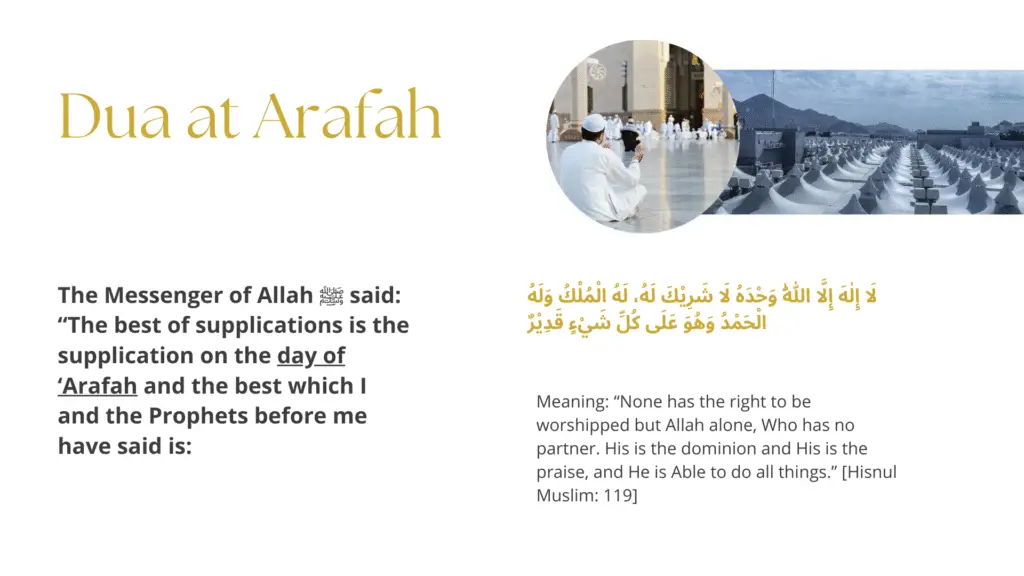
9. Takbir During Rami (Stoning the Jamarat)
When stoning the pillars in Mina, recite:
Arabic:
اَللّٰهُ أَكْبَرُ
Transliteration:
Allahu Akbar!
Meaning:
“Allah is the Greatest!” (Hisnul Muslim 121)
10. Dua When Slaughtering the Sacrifice
While offering your sacrificial animal (Hadiy), recite:
Arabic:
بِسْمِ اللّٰهِ وَاللّٰهُ أَكْبَرُ، اَللّٰهُمَّ تَقَبَّلْ مِنِّيْ
Transliteration:
Bismillahi wallahu Akbar, Allahumma taqabbal minni.
Meaning:
“In the Name of Allah, Allah is the Greatest. O Allah, accept this from me.” (Hisnul Muslim 127)
11. Renewing the Talbiyah at Dhul-Hulayfah
When entering the state of Ihram, the Prophet ﷺ would begin reciting the Talbiyah as his mount steadied. Follow his example by declaring:
“Labbaik Allahumma labbaik…”
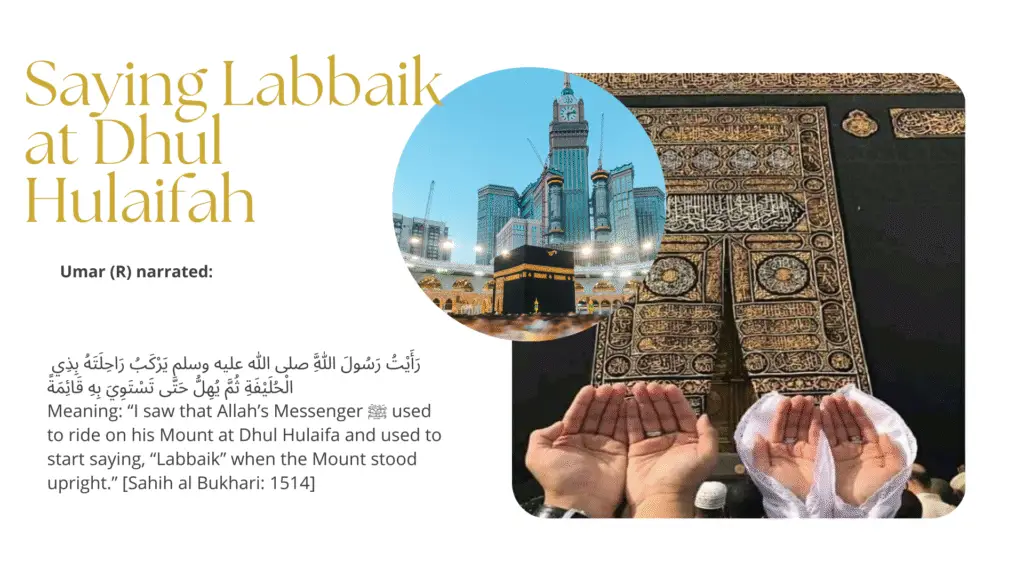
12. General Supplication Throughout Hajj
There is no restriction on what you ask for. The Prophet ﷺ said:
“The people of Hajj and Umrah are Allah’s delegation; if they call on Him, He answers them.” (Ibn Majah)
Ask for forgiveness, guidance, health, and blessings for yourself and loved ones.
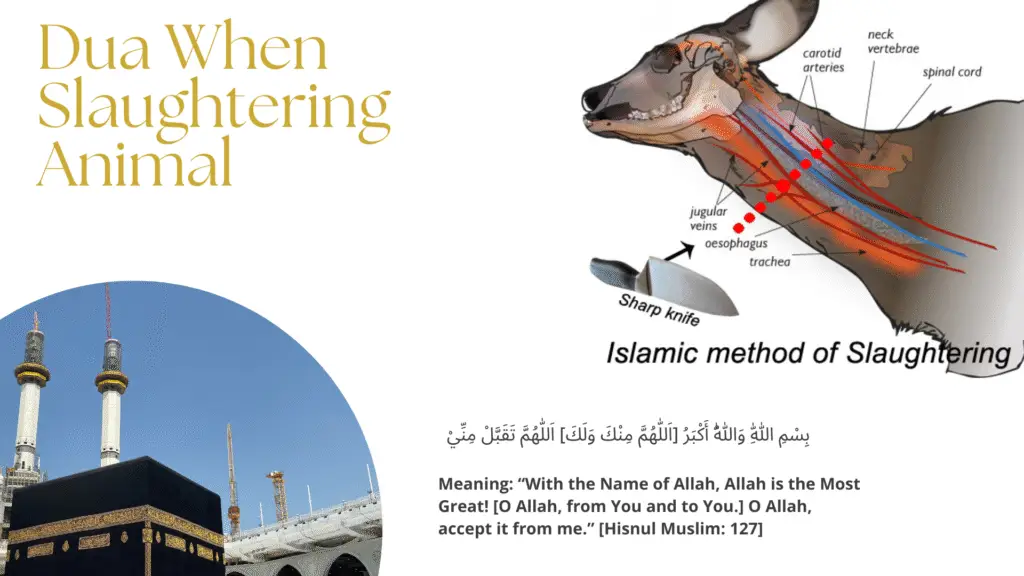
Hajj and Umrah
Hajj and Umrah are unparalleled opportunities to draw closer to Allah. By learning these essential duas, you align your pilgrimage with the Sunnah and open your heart to divine mercy. May Allah accept your efforts, forgive your sins, and grant you a Hajj Mabrur (accepted pilgrimage).
Ameen.
For more daily duas, download our Dua App and deepen your spiritual journey.
SOME MORE Internal Suggestions:

